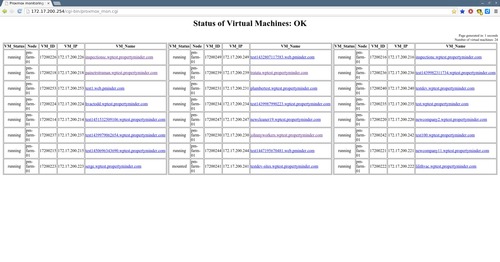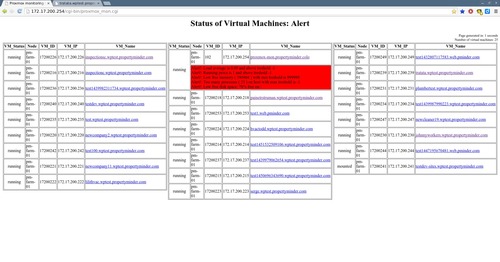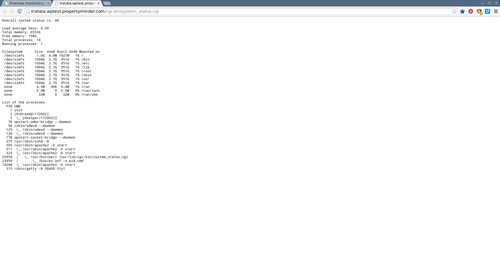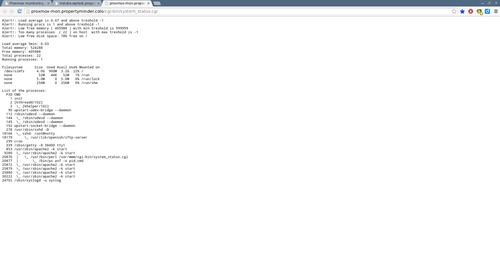Мониторим виртуалки на Proxmox (скрипт на Perl)
Постановка задачи
Есть Proxmox-кластер к большим количеством однотипных виртуальных машин (LAMP + wordpress) при этом виртуальные машины добавляются и удаляются ежедневно в больших количествах.
Решение
Будем делать так:
1. На каждую виртуальную машину кладем cgi-скрипт, который будет отдавать текущее состояние виртуальной машины. Если найдены неполадки - этот скрипт будет выдавать сообщение о тревоге.
2. На отдельную виртуальную машину кладем cgi-скрипт, который будет получать список виртуальных машин через proxmox-api, на каждой из них опрашивать первый скрипт, и отображать таблицу с результатами.
3. Натравливаем на этот (п.2) скрипт любую систему мониторинга.
Реализация
Скрипт system_status.cgi, кладем в cgi-bin на каждую виртуальную машину, в разделе triggers устанавливаем лимиты для срабатывания тревоги
1 2 3 4 5 6 7 8 9 10 11 12 13 14 15 16 17 18 19 20 21 22 23 24 25 26 27 28 29 30 31 32 33 34 35 36 37 38 39 40 41 42 43 44 45 46 47 48 49 50 51 52 53 54 55 56 57 58 59 60 61 62 63 64 65 66 67 68 69 70 71 72 73 74 75 76 77 78 79 80 81 82 83 84 85 86 87 88 89 | #!/usr/bin/perl # This script show web page with system status. Used by Proxmox monitoring script my @errors; # # constants # my $prog_ps="/bin/ps"; # # triggers # my $la_treshold=-1; # max 5min la my $procs_running_treshold=-1; # max processes running my $mem_free_treshhold=999999; # min free mem in bytes my $total_processes_treshhold=-1; # max total processes my $fs_usage_treshold=90; # min free disk space in percent # # get load average # if ($la_treshold) { open (INPUT_FILE,"/proc/loadavg"); while(<INPUT_FILE>) { chomp; @la = split (" ", $_); } close INPUT_FILE; push (@errors, "Load average is $la[0] and above treshold $la_treshold") if ( $la[0] > $la_treshold ); } # # get running procs # if ($procs_running_treshold) { open (INPUT_FILE,"/proc/stat"); while(<INPUT_FILE>) { chomp; $procs_running = $1 if ($_ =~ /^procs_running\s+(\d+)/); } close INPUT_FILE; push (@errors, "Running procs is $procs_running and above treshold $procs_running_treshold") if ( $procs_running > $procs_running_treshold ); } # # get mem info # if ($mem_free_treshhold) { open (INPUT_FILE,"/proc/meminfo"); while(<INPUT_FILE>) { chomp; $mem_total = $1 if ( $_ =~ /^MemTotal:\s+(\d+)\s.*$/ ); $mem_free = $1 if ( $_ =~ /^MemFree:\s+(\d+)\s.*$/ ); $mem_buffers = $1 if ( $_ =~ /^Buffers:\s+(\d+)\s.*$/ ); $mem_cached = $1 if ( $_ =~ /^Cached:\s+(\d+)\s.*$/ ); } close INPUT_FILE; $mem_free = $mem_free + $mem_buffers + $mem_cached; push (@errors, "Low free memory \( $mem_free \) with min treshold is $mem_free_treshhold") if ( $mem_free < $mem_free_treshhold ); } # # get process list # if ($total_processes_treshhold) { @process_list = `$prog_ps axf -o pid,cmd`; my $total_processes = scalar(@process_list)-1; push (@errors, "Too many processes \( $total_processes \) on host with max treshold is $total_processes_treshhold") if ( scalar(@process_list)-1 > $total_processes_treshhold ); } # # get filesystems stats # if ($fs_usage_treshold) { @fs_stats=`df -h`; foreach ( @fs_stats ){ $_ =~ m/.*\s(\d+)\%\s(\S+)$/i; my $disk_free_space = 100-$1; push (@errors, "Low free disk space: $disk_free_space% free on $2") if ( $disk_free_space < $fs_usage_treshold ); } } # # Print all stats # print "Content-Type: text/plain\n"; print "\n"; if ( @errors ) { foreach (@errors) { print "Alert!: $_\n";} } else {print "Overall system status is: OK\n";} print "\n"; print "Load average 5min: $la[1]\n" if ($la_treshold); print "Total memory: $mem_total\n" if ($mem_free_treshhold); print "Free memory: $mem_free\n" if ($mem_free_treshhold); print "Total processes: ", scalar(@process_list)-1,"\n" if ($total_processes_treshhold); print "Running processes: $procs_running\n" if ($procs_running_treshold); print "\n"; print "@fs_stats" if ($fs_usage_treshold); print "\n"; print "List of the processes:\n" if ($total_processes_treshhold); if ($total_processes_treshhold) { foreach ( @process_list ) { print $_; } } |
Скрипт proxmox_mon.cgi размещаем на хосте, который имеет доступ ко всем виртуальным машинам, в массиве @excluded_ids перечисляем vmid виртуалок, которые не нужно мониторить.
1 2 3 4 5 6 7 8 9 10 11 12 13 14 15 16 17 18 19 20 21 22 23 24 25 26 27 28 29 30 31 32 33 34 35 36 37 38 39 40 41 42 43 44 45 46 47 48 49 50 51 52 53 54 55 56 57 58 59 60 61 62 63 64 65 66 67 68 69 70 71 72 73 74 75 76 77 78 79 80 81 82 83 84 85 86 87 88 89 90 91 92 93 94 95 96 97 98 99 100 101 102 103 104 105 106 107 108 109 110 111 112 113 114 115 116 117 118 119 120 121 122 123 124 125 | #!/usr/bin/perl -l # This script will show web page with list of all proxmox VM-s # List of vm-id's which we are wish to exclude from monitoring my @excluded_ids=('108','109','110','111'); use strict; use CGI::Carp qw(fatalsToBrowser); use Net::Proxmox::VE; use LWP::UserAgent; use HTML::Template; use Switch; # Global variables my $status_is_alert; my $status_is_warning; my $starting_time = time; my $vm_counter = 0; my $row_counter = 1; my @RUNNING_VM_ROW1_DATA; my @RUNNING_VM_ROW2_DATA; my @RUNNING_VM_ROW3_DATA; # Prepare web user agent $ENV{PERL_LWP_SSL_VERIFY_HOSTNAME} = 0; my $ua = LWP::UserAgent->new; $ua->agent("proxmox_status_mon"); $ua->timeout(5); # Prepare proxmox api agent and connect to proxmox my %args = ( host => '192.168.1.2', username => 'login', password => 'password', port => '8006', realm => 'pve', # debug => 'true' ); my $host = Net::Proxmox::VE->new(%args); $host->login() or &error_exit; # get pve version and set virtualization_tech according to pve version for use in future requests my $version_hash = $host->get("/version"); # this request return hash with version information my $virtualization_tech = 'lxc'; $virtualization_tech = 'openvz' if ( ${$version_hash}{'version'} < 4 ); # Get nodes list from proxmox, foreach node get virtual machines, read status and prepare data for output my @nodes = $host->get("/nodes"); foreach (@nodes){ my %node_info=%{$_}; my @vm_list = $host->get("/nodes/$node_info{'node'}/$virtualization_tech"); foreach (@vm_list){ my %vm_info=%{$_}; next if ($vm_info{'vmid'} ~~ @excluded_ids); $vm_counter++; my %row_data; $row_data{'VM_Status'}=$vm_info{'status'}; $row_data{'VM_NODE'}=$node_info{'node'}; $row_data{'VM_ID'}=$vm_info{'vmid'}; if ( $virtualization_tech eq 'lxc' ){ my $net_config = $host->get("/nodes/$node_info{'node'}/lxc/$vm_info{'vmid'}/config"); ${$net_config}{'net0'} =~ /.*ip=(\d+\.\d+\.\d+\.\d+).*/; $row_data{'VM_IP'}=$1; } else { $row_data{'VM_IP'}=$vm_info{'ip'}; } $row_data{'VM_Name'}=$vm_info{'name'}; if ( $row_data{'VM_Status'} eq "running" ) { $row_data{'VM_Status_Info'}=&get_vm_stats ($row_data{'VM_IP'}); if ( $row_data{'VM_Status_Info'} =~ m/Warning.*/ ) { $row_data{'WARNING'} = 1; $status_is_warning = 1; }; if ( $row_data{'VM_Status_Info'} =~ m/Alert.*/ ) { $row_data{'ALERT'} = 1; $status_is_alert = 1; }; } switch ($row_counter) { case 1 { push(@RUNNING_VM_ROW1_DATA, \%row_data); $row_counter++; } case 2 { push(@RUNNING_VM_ROW2_DATA, \%row_data); $row_counter++; } case 3 { push(@RUNNING_VM_ROW3_DATA, \%row_data); $row_counter=1;} } } } my $generation_time = time - $starting_time; # Print out data thru template print "Content-Type: text/html\n\n"; my $template = HTML::Template->new(filename => 'template.html'); $template->param(GENERATION_TIME => $generation_time); $template->param(VM_COUNTER => $vm_counter); $template->param(ALERT => $status_is_alert); $template->param(WARNING => $status_is_warning); $template->param(RUNNING_VM_ROW1 => \@RUNNING_VM_ROW1_DATA); $template->param(RUNNING_VM_ROW2 => \@RUNNING_VM_ROW2_DATA); $template->param(RUNNING_VM_ROW3 => \@RUNNING_VM_ROW3_DATA); print $template->output(); # Get status from VM procedure sub get_vm_stats ($vm_ip){ my $vm_ip = @_[0]; my $return_value; my $req = HTTP::Request->new(GET => "http://$vm_ip/cgi-bin/system_status.cgi"); my $res = $ua->request($req); if ( $res->is_error ) { my $status_line = $res->status_line; return ("Alert! unable to get VM status: $status_line") if ( $status_line =~ m/.*500.*/ ); return ("Alert! unable to get VM status: $status_line") if ( $status_line =~ m/.*500.*/ ); return ("Warning! unable to get VM status: $status_line"); } my $system_status = $res->content; if( $system_status =~ m/(Alert!:.*\n)/i ) { foreach ( split ("\n", $system_status) ) { $return_value = $return_value.$1."<br>" if ( $_ =~ m/(Alert!:.*)/i ); } } else { $return_value = undef; } return $return_value; } sub error_exit {print "Couldnt log in to proxmox host $args{'host'}"; die ('Couldnt log in to proxmox host');} |
Туда же кладем темплейт страницы с отчетом:
<!-- proxmox_mon.tmpl --> <html> <head> <title>Proxmox monitoring tool</title> </head> <body> <!-- TMPL_IF ALERT --> <h1 align=center>Status of Virtual Machines: Alert</h1> <!-- TMPL_ELSE --> <!-- TMPL_IF WARNING --> <h1 align=center>Status of Virtual Machines: Warning</h1> <!-- TMPL_ELSE --> <h1 align=center>Status of Virtual Machines: OK</h1> <!-- /TMPL_IF --> <!-- /TMPL_IF --> <p style="text-align: right; font-size: small; margin: 0;">Page generated in: <!-- TMPL_VAR NAME=GENERATION_TIME --> seconds</p> <p style="text-align: right; font-size: small; margin: 0;">Number of virtual machines: <!-- TMPL_VAR NAME=VM_COUNTER --></p> <table width=100%> <tr> <td align=center valign=top> <table border=1 width=100%> <tr> <th>VM_Status</th> <th>Node</th> <th>VM_ID</th> <th>VM_IP</th> <th>VM_Name</th> </tr> <!-- TMPL_LOOP NAME=RUNNING_VM_ROW1 --> <tr> <!-- TMPL_IF VM_Status_Info --> <td rowspan=2 align=center> <!-- TMPL_ELSE --> <td align=center> <!-- /TMPL_IF --> <!-- TMPL_VAR NAME=VM_Status --></td> <td><!-- TMPL_VAR NAME=VM_NODE --></td> <td><!-- TMPL_VAR NAME=VM_ID --></td> <td><!-- TMPL_VAR NAME=VM_IP --></td> <td><a target="_blank" href="http://<!-- TMPL_VAR NAME=VM_Name -->/cgi-bin/system_status.cgi"><!-- TMPL_VAR NAME=VM_Name --></a></td> </tr> <!-- TMPL_IF VM_Status_Info --> <tr> <td colspan="4" <!-- TMPL_IF WARNING -->style="background-color: yellow;"<!-- /TMPL_IF --> <!-- TMPL_IF ALERT -->style="background-color: red;"<!-- /TMPL_IF --> > <!-- TMPL_VAR NAME=VM_Status_Info --> </td> </tr> <!-- /TMPL_IF --> <!-- /TMPL_LOOP --> </table> </td> <td align=center valign=top> <table border=1 width=100%> <tr> <th>VM_Status</th> <th>Node</th> <th>VM_ID</th> <th>VM_IP</th> <th>VM_Name</th> </tr> <!-- TMPL_LOOP NAME=RUNNING_VM_ROW2 --> <tr> <!-- TMPL_IF VM_Status_Info --> <td rowspan=2 align=center> <!-- TMPL_ELSE --> <td align=center> <!-- /TMPL_IF --> <!-- TMPL_VAR NAME=VM_Status --></td> <td><!-- TMPL_VAR NAME=VM_NODE --></td> <td><!-- TMPL_VAR NAME=VM_ID --></td> <td><!-- TMPL_VAR NAME=VM_IP --></td> <td><a target="_blank" href="http://<!-- TMPL_VAR NAME=VM_Name -->/cgi-bin/system_status.cgi"><!-- TMPL_VAR NAME=VM_Name --></a></td> </tr> <!-- TMPL_IF VM_Status_Info --> <tr> <td colspan="4" <!-- TMPL_IF WARNING -->style="background-color: yellow;"<!-- /TMPL_IF --> <!-- TMPL_IF ALERT -->style="background-color: red;"<!-- /TMPL_IF --> > <!-- TMPL_VAR NAME=VM_Status_Info --> </td> </tr> <!-- /TMPL_IF --> <!-- /TMPL_LOOP --> </table> </td> <td align=center valign=top> <table border=1 width=100%> <tr> <th>VM_Status</th> <th>Node</th> <th>VM_ID</th> <th>VM_IP</th> <th>VM_Name</th> </tr> <!-- TMPL_LOOP NAME=RUNNING_VM_ROW3 --> <tr> <!-- TMPL_IF VM_Status_Info --> <td rowspan=2 align=center> <!-- TMPL_ELSE --> <td align=center> <!-- /TMPL_IF --> <!-- TMPL_VAR NAME=VM_Status --></td> <td><!-- TMPL_VAR NAME=VM_NODE --></td> <td><!-- TMPL_VAR NAME=VM_ID --></td> <td><!-- TMPL_VAR NAME=VM_IP --></td> <td><a target="_blank" href="http://<!-- TMPL_VAR NAME=VM_Name -->/cgi-bin/system_status.cgi"><!-- TMPL_VAR NAME=VM_Name --></a></td> </tr> <!-- TMPL_IF VM_Status_Info --> <tr> <td colspan="4" <!-- TMPL_IF WARNING -->style="background-color: yellow;"<!-- /TMPL_IF --> <!-- TMPL_IF ALERT -->style="background-color: red;"<!-- /TMPL_IF --> > <!-- TMPL_VAR NAME=VM_Status_Info --> </td> </tr> <!-- /TMPL_IF --> <!-- /TMPL_LOOP --> </table> </td> </tr> </table> </body> </html>
Ну и натравливаем на все это мониторинг по ключевому слову Alert.
Скриншоты
| proxmox_mon.cgi - состояние OK | proxmox_mon.cgi - состояние Alert |
 |
 |
| system_status.cgi - состояние OK | system_status.cgi - состояние Alert |
 |
 |